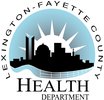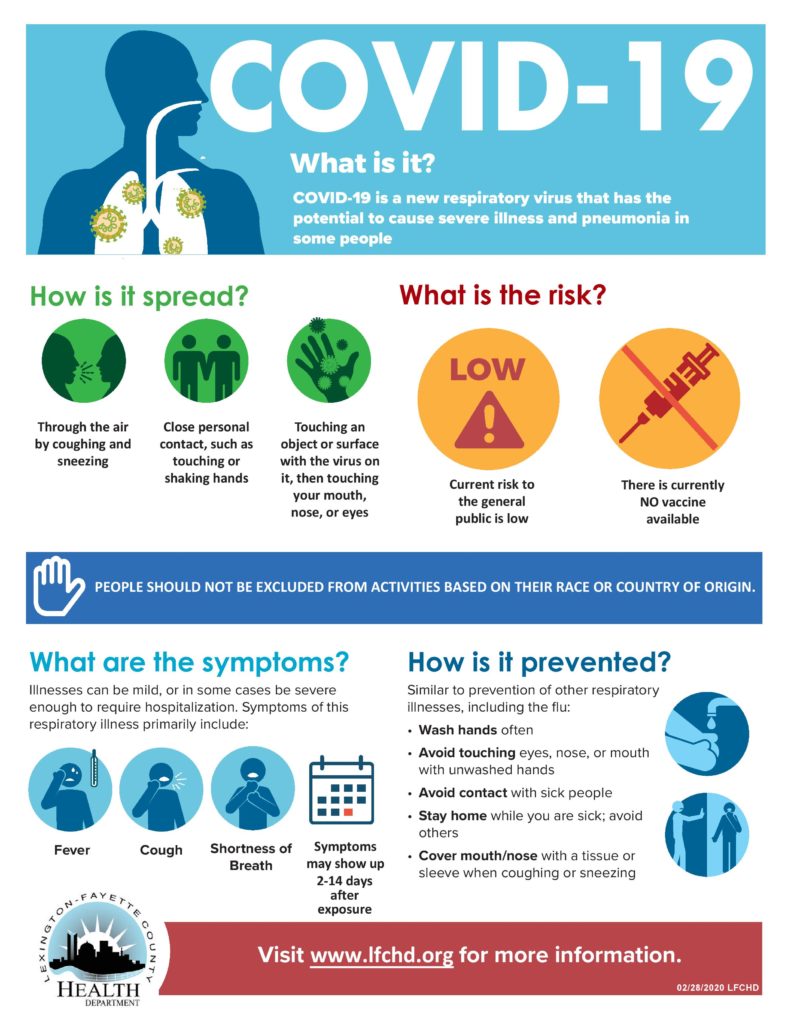¿Qué es el coronavirus?
Los
coronavirus son una gran familia de virus que son comunes en muchas especies
diferentes de animales, incluyendo camellos, ganado, gatos y murciélagos.
Algunos coronavirus de procedencia animal pueden infectar a las personas y
luego propagarse entre las personas. Actualmente, aquí en Kentucky, hay cuatro
coronavirus que comúnmente circulan entre los seres humanos y causan
enfermedades leves, como el resfriado común.
¿Hay algún caso COVID-19 en Kentucky?
Hay
casos confirmados de COVID-19 actualmente en Kentucky. Algunas personas están
siendo monitoreadas en busca de cualquier signo o síntoma debido a su reciente
viaje y posible exposición a casos de COVID-19, pero no se consideran personas
bajo investigación.
¿Existen otros tipos de coronavirus?
Hay
cuatro coronavirus que circulan comúnmente cada otoño e invierno en el condado
de Fayette. Estos son muy diferentes a el nuevo virus COVID-19 que comenzó en
China en 2019. Un diagnóstico con coronavirus 229E, NL63, OC43 o HKU1 no es lo
mismo que un diagnóstico DE COVID-19.
¿Cómo se propaga el COVID-19?
- Se cree que el virus se propaga principalmente de persona a persona.
- Entre personas que están en contacto cercano entre ellas (dentro de unos 6 pies).
- A través de gotitas respiratorias producidas cuando una persona infectada tose o estornuda.
- Estas gotitas pueden aterrizar en la boca o nariz de las personas que están cerca o posiblemente ser inhaladas en los pulmones.
- En los Estados Unidos, la propagación de persona a persona ha ocurrido sólo entre unos pocos contactos cercanos. COVID-19 es una enfermedad emergente y hay mucho más que aprender sobre su transmisión y gravedad.
¿Estoy en riesgo de padecer COVID-19?
El
riesgo individual de COVID-19 depende de la exposición. Para el público en
general estadounidense, que es poco probable que esté expuesto a este virus en
este momento, el riesgo inmediato para la salud de COVID-19 se considera bajo.
En las circunstancias actuales, algunas personas tendrán un mayor riesgo de
infección (es decir, los trabajadores de la salud que atienden a pacientes con
COVID-19). Para obtener más información sobre la evaluación del riesgo de
personas con exposiciones potenciales a COVID-19, el CDC ha desarrollado una
Evaluación y Manejo del Riesgo Basado en Diferentes Exposiciones al COVID-19.
¿Existe una vacuna para COVID-19?
Actualmente
no existe una vacuna para prevenir el COVID-19. Se estima que puede estar
disponible en algún momento de 2021.
¿Cómo puedo ayudar a protegerme?
La
mejor manera de prevenir enfermedades es evitar estar expuesto a este virus.
Sin embargo, hay acciones preventivas diarias que puede hacer para ayudar a
prevenir la propagación de este virus.
- Lávese las manos a menudo con agua y jabón, especialmente después de ir al baño; antes de comer; y después de sonarse o soplarse la nariz, toser o estornudar.
- Evite el contacto cercano con personas enfermas.
- Evite tocarse los ojos, la nariz y la boca.
- Quédese en casa cuando esté enfermo.
- Cubra la tos o estornude con un pañuelo de papel y, a continuación, tire el pañuelo de papel a la basura.
- Limpie y desinfecte los objetos y superficies tocados con frecuencia con un desinfectante en spray o toallita de limpieza doméstica regular.
¿Tiene alguna máscara disponible?
El CDC
no recomienda que las personas que están bien usen una máscara facial para
protegerse de enfermedades respiratorias, incluyendo COVID-19. Las máscaras
faciales deben ser utilizadas por personas que muestren síntomas de COVID-19
para ayudar a prevenir la propagación de la enfermedad a otras personas. El
Departamento de Salud del Condado de Lexington-Fayette no tiene máscaras para
distribuir al público.
¿Cómo puedo desinfectar mi hogar o lugar
de trabajo?
Limpie
las superficies y objetos que se tocan con frecuencia a diario (como mesas,
superficie de cocina, interruptores de luz, perilla de las puertas, manijas de
gabinetes, etc.) utilizando un detergente doméstico regular y agua. Si las
superficies están sucias, deben limpiarse con un detergente y agua antes de desinfectar.
¿Debo cancelar mi viaje?
El CDC
proporciona recomendaciones sobre posponer o cancelar viajes. Estos se
denominan avisos de viaje y se basan en la evaluación de los riesgos
potenciales para la salud que implica viajar a un área determinada. Una lista de
destinos con avisos de viaje está disponible en el sitio web de CDC COVID-19.
¿Cuál es el riesgo de contraer COVID-19 en
un avión?
Debido
a cómo circula el aire y se filtra en los aviones, la mayoría de los virus y
otros gérmenes no se propagan fácilmente en los aviones. Aunque el riesgo de
infección en un avión es bajo, los viajeros deben tratar de evitar el contacto
con los pasajeros enfermos y lavarse las manos a menudo con agua y jabón
durante al menos 20 segundos o usar desinfectante de manos que contenga 60%-95%
de alcohol.
¿Es seguro ir en un crucero?
A
menudo, los cruceros ponen a un gran número de personas, de países de todo el
mundo, en contacto frecuente y cercano entre sí. Esto puede promover la
propagación de virus respiratorios, como el virus que causa COVID-19. Usted
puede enfermarse por contacto cercano con una persona infectada o tocando
superficies contaminadas.
Para reducir la propagación de los virus respiratorios,
incluido COVID-19, el CDC recomienda que los miembros de la tripulación y los
pasajeros:
- Eviten el contacto cercano con personas enfermas.
- Eviten tocarse los ojos, la nariz y la boca con las manos sin lavar.
- Se laven las manos a menudo con agua y jabón durante al menos 20 segundos, especialmente después de ir al baño; antes de comer; y después de sonarse o soplarse la nariz, toser o estornudar.
- Si el agua y el jabón no están disponibles fácilmente, use un desinfectante de manos a base de alcohol que contenga 60%-95% de alcohol.
- Permanezcan en su camarote cuando esté enfermo e informe al centro médico a bordo inmediatamente si tiene fiebre (100.4 oF/38˚C o más), comience a sentir fiebre o tenga otros síntomas (como tos, secreción nasal, dificultad para respirar o dolor de garganta).

